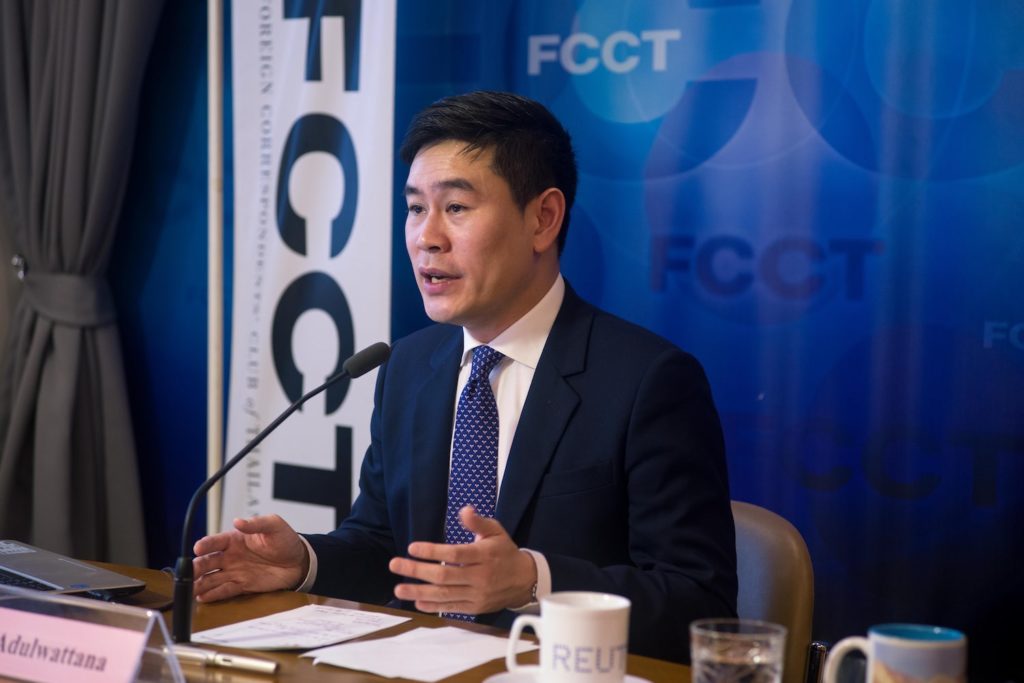Economist urges ‘blanket’ rescue

Bangkok Bank chief economist Burin Adulwattana speaks at the Foreign Correspondents’ Club of Thailand on March 18, 2020. (Photo by Jonathan Head)
Handouts of “helicopter money”, blanket debt repayment postponements and massive fiscal stimulus programmes are needed to keep Thailand and the rest of the world afloat during the coronavirus pandemic, according to Bangkok Bank’s chief economist.
Speaking via a live stream at the Foreign Correspondents’ Club of Thailand in Bangkok on Wednesday, Burin Adulwattana painted a grim picture, predicting global growth could fall to 2.4% this year, and possibly as low as 1.5%, while Thai growth could slide beneath 1%.
Drastic interest rate cuts have failed to stop the free fall in markets worldwide and inject precious liquidity, he said. The service industry — a huge part of the Thai and global economy — is grinding to a halt as countries go into lockdown.
The level of uncertainty is unprecedented in the modern era, surpassing that of the 1997 Asian financial crisis and the 2008 global crash. The uncertainty is exacerbated by the hazy picture delivered by patchy health statistics: because testing has been so limited worldwide, we don’t know how quickly the novel coronavirus is spreading, let alone its future transmission rates.
For instance, Sophon Iamsirithavorn, chief of the Communicable Disease Division, this week estimated that anywhere between 400,000 and 37.4 million Thais would be infected with SARS-CoV-2, the novel coronavirus that causes the Covid-19 disease, by the end of 2021, with a death rate “of less than 2%”. But how much less? The actual figure, according to Stanford professor John PA Ioannidis, is likely to be closer to 0.3% or lower. The study looked at the only place where 100% of people were tested — the Diamond Princess, with a large proportion of elderly guests — and applied it to the age structure of the general US population. The resulting estimate for the death rate was only 0.125%.
If scientific projections of the deadliness of this disease vary so widely, how can we chart an economic course? We do know that the cost to the Thai, Asian and global economies has already been severe. Thailand, Mr Burin said, is a “3D” economy — beset by Disease, Drought and Delay in the budget. Some 20% of the kingdom’s GDP comes from tourism but arrivals have fallen by three-quarters, while those from China have dropped 85%. Private sector confidence is down, and because many factories have excess capacity as a result of the US-China trade war, he said, private investment will slow.
Unlike the Asian financial crisis of 1997 and the global crash of 2008, this crisis did not emanate from the banking sector — but it could spread there, Mr Burin said.
“There’s a real possibility that the problems could move from tourism, travel and hospitality into the banking sector. It’s the opposite of 2008. The government has to put out the fire.”
Even if the virus is brought under control in the next few months, the economist said, the hit to the economy from lost services transactions is permanent: if you can’t get a haircut for four months, you don’t run out and get four haircuts when you can, and you don’t order multiple meals from a restaurant to make up for the ones you missed.
So what can the Thai government do? Mr Burin said he expected the Bank of Thailand (BoT) to cut its benchmark interest rate from the current record low of 1% to just 0.5% at its next meeting, although he thinks policy rates here will not drop to zero or even negative territory, as in Europe. But he pointed out that all the trillions of dollars in quantitative easing to boost liquidity around the world in recent weeks have failed to calm the markets.
“You can’t cut interest rates to kill the coronavirus epidemic. You can’t make people suddenly feel healthy enough to go out and spend and start drinking. That’s not going to happen.”
Mr Burin foresees a global scenario of empty shops, bankrupt shopping malls, closed-down hotels and insolvent airlines. Meanwhile a lockdown scenario, he said, could be catastrophic for ordinary Thais.
“What are we going to do if people are unable to leave their houses and go to work? What if you have mortgages? What if you are a shop owner and have to pay rent? What happens if you need income to pay for your credit card?
“No amount of interest rate cuts, no amount of liquidity is going to be able to solve this problem.”
The only answer, he said, is fiscal, not monetary — governments must open their wallets to help their citizens.
“When life comes to a standstill, the government has to play its part [and say] ‘Don’t worry about your debt payment now, all will be taken care of.'”
The Bangkok Bank expert said recently-issued BoT guidelines for major banks to offer piecemeal debt restructuring were too vague and would take too long to implement on a client-by-client basis. “You have to do a blanket rescue like they are doing in Italy or France. Better you save everyone for three months.”
Mr Burin said that unlike heavily indebted countries like Japan, Thailand’s relatively low debt-to-GDP ratio leaves room for fiscal stimulus. But despite the urgency, he sounded a note of caution, warning that debt relief and what he termed “helicopter money” giveaways can only be a short-term solution.
“How long can they keep on printing money and save the whole country? This is going to be a big problem over the next few months.”
The problem then, he added, would be weaning the population off government handouts.
Despite the bleak picture, Mr Burin believes the pandemic will end sooner rather than later.
He hopes that rising temperatures will mean the crisis will largely have passed by July. “As Churchill said, no point being a pessimist.”